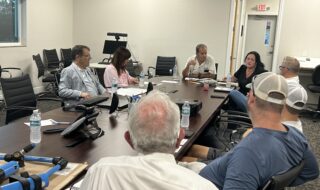June 28, 2025
Small business was able to successfully defend against some major attacks
NFIB State Director Anthony Smith reports from Salem
The Oregon State Legislature adjourned sine die on Day 158 of the 160-day 2025 Session. Although I would characterize this year’s legislative session as especially challenging, small business was able to successfully defend against some major attacks. We suffered several losses along the way but managed a few wins as well.
With the majority party winning supermajorities in both chambers of the Legislature last November, we’ve been on high alert for the last six months, worried about a major tax increase directly aimed at Oregon businesses.
That didn’t happen. For sure, this was our greatest victory in 2025 – and it will be our ongoing challenge as we prepare for the 2026 short session in February. Here’s what happened in the Oregon Capitol during the final weeks of the 2025 legislative session:
Transportation ReInvestment Package
The most spectacular failure of this year’s legislative session (but a big win for Oregonians who don’t want to pay more in taxes and fees) was the Transportation ReInvestment Package (TRIP). The final version of HB 2025 would have raised an additional $11.7 billion in taxes and fees over the next 10 years to pay for transportation infrastructure in Oregon.
NFIB sent a special member ballot to its members to determine their level of support or opposition for the TRIP. We specifically asked whether Oregon should “adopt new taxes & fees and increase existing taxes & fees to fund transportation infrastructure.” The response was clear, with 95% of respondents opposing the package.
Our ballot results here in Oregon confirmed NFIB’s most recent quadrennial Small Business Problems and Priorities report, which was published in August 2024. Out of 75 small business issues, the “Cost of Natural Gas, Propane, Gasoline, Diesel, Fuel Oil” was the 6th most severe problem cited by small business owners, moving up from its 19th place ranking in 2020. Nearly a quarter (24%) reported it as a critical concern. Conversely, “Traffic, Highways, Roads, Bridges” was ranked 48th in 2024, moving little from its 47th ranking four years prior.
For small businesses, the current cost pressures of transportation fuel far outweigh challenges relating to transportation infrastructure. The fuel tax increases proposed by HB 2025 would have added to that pressure significantly and make Oregon’s fuel tax one of the highest in the country, not to mention the various other taxes and fees proposed by the bill, including the proposed tripling of the current statewide payroll tax. The bill advanced out of the Joint Committee on Transportation Reinvestment on a party line vote but ultimately failed to pass in either chamber.
Small Business vs. Big Labor
Organized labor was incredibly aggressive in pushing their legislative agendas this year – not surprising considering their substantial role in achieving supermajorities in both chambers during last year’s election.
As noted in a prior update, SB 426 passed and was later signed into law by Gov. Tina Kotek. It makes general contractors and certain property owners liable for the unpaid wages of their subcontractors. SB 916, which allows workers to receive unemployment benefits while on strike, also passed and was signed into law.
Another measure we highlighted in a previous update also passed and was signed by the governor: HB 2957 expands the current 90-day window to sue, following the investigation of a complaint by the Oregon Bureau of Labor and Industries (BOLI), even in cases where there was no evidence of a violation. And lastly, in the final days of the session, HB 2688, was moved out of the Joint Committee on Ways and Means and passed in both chambers. The bill expands Oregon’s prevailing wage laws to include certain off-site, custom work fabricated, preconstructed, assembled or constructed in accordance with specifications for public projects
These were each tough losses with real world consequences for the future.
However, NFIB and our many coalition partners were able to successfully defeat efforts to establish industry-specific labor standards boards, which would allow the Oregon Legislature to abdicate its authority and give lawmaking power to unelected boards of political appointees. HB 2548 (Agriculture Workforce Labor Standards Board) was amended into a bill directing Portland State University and Oregon State University to study and report back to the Legislature regarding the status of Oregon’s agricultural labor laws. A separate measure, HB 3838 (Home and Community-Based Workforce Standards Board) failed to receive a floor vote in either chamber after being passed out of the House Rules Committee and sent to Ways & Means.
Unemployment Insurance Tax Relief Victory
Unfortunately, the Legislature was not willing to take up meaningful tax reform on our big priorities like the Corporate Activity Tax (CAT) or our worst-in-the-nation Estate (Death) Tax. However, we were able to get at least one important bill over the finish line.
HB 2271 provides a limited, one-time, unemployment insurance (UI) payroll tax credit for certain businesses with UI experience ratings that were frozen at artificially high levels due to the COVID-19 pandemic.
About 1,000 Oregon employers will benefit from the credit, 80% of which are small businesses with fewer than 25 employees. Importantly, this one-time credit has a very limited impact on the UI Trust Fund. It is not projected to affect the state’s UI tax schedule, and it should have no impact on employer UI tax rates. If it did – or if we had even the slightest concern that it would – NFIB would have been first in line to oppose the measure.
However, NFIB fully supported HB 2271 because it will provide limited but meaningful UI tax relief for those businesses that were adversely impacted by the passage of HB 3389 in 2021, which among other provisions, froze UI experience ratings for all employers for three calendar years (2022-2024). This was beneficial for the vast majority of Oregon businesses, but for businesses with an atypical UI claim against their account in the year or two leading up to the pandemic, the freeze locked them into an unusually high experience rating (and higher taxes owed) for those three years.
The bill passed unanimously in both chambers.
Protecting Insurance Affordability
Another bill we worked all session to oppose was SB 174, which would have added trade practices already prohibited by Oregon’s insurance statutes to Oregon’s Unlawful Trade Practices Act (UTPA), finally died when the Legislature adjourned June 27.
As mentioned in a previous update, SB 174 would have moved Oregon’s insurance market away from a proven model that is working for most Oregonians to one that incentivizes litigation. Oregon already has a system in place for consumers to bring a lawsuit or file a complaint with the state’s insurance commissioner if they feel they have been treated unfairly. Under Oregon’s Unfair Claims Settlement Practices Act, the insurance division can order insurers to pay claims, as well as require restitution and levy fines against insurers that act in bad faith.
Additional enforcement under Oregon’s UTPA would have led to more lawsuits and increased costs for insurers, creating market pressure to increase premiums for insurance customers. For many Oregon consumers and businesses, this would mean policyholders paying more for the same coverage – and if they cannot afford to pay more, they risk leaving themselves under-insured.
The bill sat on the Senate President’s desk for over two months before coming up for a surprise vote on the Senate floor on June 19. The bill passed with bipartisan support AND bipartisan opposition. Two Democratic senators voted with most Republicans to oppose the measure while one Republican joined 15 Democrats to pass the bill.
The bill received a public hearing in the House Committee on Rules a few days later, but failed to receive a committee work session or a floor vote in the House. Undoubtedly, the trial lawyers will be back in 2026 (and beyond) to fight this fight again, but at least for now, we remain victorious!
Prior Legislative Reports
— May 31: Legislature in Final Month of 2025 Session
— May 10: May 23 Deadline Approaches for Bills to Live or Die
— April 25: Legislators’ Eyes on May 14 Revenue Forecast
— April 12: Oregon Legislature Reaches Mid-Point of 2025 Session
— March 21: Bills Look to Incentivize Litigation, End At-Will Employment
— March 8: NFIB Testifies for Bill Correcting UI Tax Trap
— February 14: Bad Age-Discrimination Bill Resurfaces. Flurry of Activity on Estate Tax
— February 1: Oregon Legislators Begin Work on 2,500 Bills
NFIB is a member-driven organization advocating on behalf of small and independent businesses nationwide.
Related Articles














